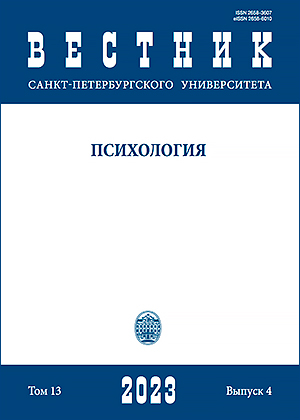Individualization and psychologization of modern society as factors of weakening social ties
DOI:
https://doi.org/10.21638/spbu16.2023.401Abstract
The article proves the thesis according to which psychology, as a scientific discipline and social practice (in the form of psychotherapy and counseling), penetrating into all spheres of everyday life in modern society, is a response to the worldview contradictions of the era of modernism. The paradigms of post- and metamodernism that characterize our time can rightfully be considered a continuation of the main line of early modernism of the early twentieth century, associated with the understanding of modernization (the historical process of transition from a traditional and sustainable way of life to social uncertainty and instability). Therefore, modernity is also called the era of late modernism. In modern society and culture, the responsibility for solving the problem of the stability and variability of life is attributed not to collectives or groups, as in previous historical periods, but to individuals. Now, not philosophy or anthropology, but psychology as the scientific project of modernism seeks to answer the famous Kantian question about what a person is. The mass dissemination of psychological knowledge and practice leads to the psychologization of society, that is, to the explanation of the surrounding world and life problems only with the help of psychological categories; a person fixes on the inner experience and personal self-development, thereby distancing himself from unpredictable social events and changes. The psychologization of society enhances its individualization. Individualization is seen as a dual phenomenon: on the one hand, it implies the most free and active construction of identity and lifestyle, and on the other hand, it carries the danger of social atomization and the collapse of solidarity, which can be a prerequisite for the formation of totalitarian mass movements. The paradox: individualization and psychologization, designed to reduce social uncertainty, increase it, locking a person into his own Self. To prevent the negative effects listed above, it is recommended to strengthen psychological concepts in scientific and public discourses that emphasize the importance of intersubjective, joint construction of the image of a changing world.
Keywords:
modernity, modernism, social uncertainty, psychologization, psychological society, individualization, singularization
Downloads
References
References
Beck, U. (2000). Risk Society: towards a new modernity. Moscow, Progress-Tradition Publ. (In Russian)
Downloads
Published
How to Cite
Issue
Section
License
Articles of "Vestnik of Saint Petersburg University. Psychology" are open access distributed under the terms of the License Agreement with Saint Petersburg State University, which permits to the authors unrestricted distribution and self-archiving free of charge.




